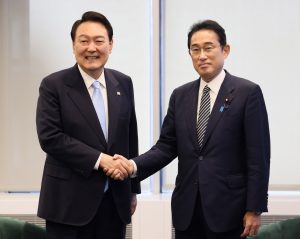Japanese Prime Minister Kishida Fumio said Tuesday he is arranging a trip to South Korea for talks with President Yoon Suk-yeol in return for Yoon’s March visit to Tokyo, aiming to further strengthen their ties before the upcoming summit of the Group of Seven industrialized nations.
Tokyo and Seoul have been working to repair relations that were strained over wartime history disputes as they deepen three-way security cooperation with Washington in response to growing regional threats from North Korea and China.
Speaking to reporters Tuesday in Ghana as part of his trip to Africa and Singapore, Kishida said he hopes to visit South Korea on May 7-8 and exchange views with Yoon on ways to speed up the strengthening of bilateral ties and discuss regional and global issues.
“If my South Korea visit is achieved ahead of the G-7 summit, I expect it will be a great opportunity to give impetus to our ‘shuttle diplomacy’ and have a heart-to-heart exchange of our views on accelerating Japan-South Korea ties and drastically changing the global situation,” said Kishida, who is hosting the May 19-21 G-7 summit in Hiroshima.
Later Tuesday, both governments confirmed Kishida’s trip and their talks in Seoul.
Yoon’s office said Kishida will make a “working visit” to South Korea with his wife, Kishida Yuko, following the president’s invitation during his Tokyo visit in March, marking a fresh start in their diplomacy. Kishida’s office said talks between the leaders were scheduled for Sunday.
Kishida will be the first Japanese leader to visit South Korea since former Prime Minister Abe Shinzo attended the PyeongChang Olympics in February 2018. The two leaders are expected to focus on cooperation and responses to North Korea’s nuclear and missile development.
Japan and South Korea want to ensure their relationship is on track for a considerable recovery ahead of the G-7 summit, where Yoon is invited as one of eight outreach nations. The two leaders are also expected to hold a trilateral meeting with U.S. President Joe Biden on the sidelines.
But later Tuesday, Japan’s Foreign Ministry said it strongly protested to South Korea’s embassy in Tokyo over a trip by South Korean opposition lawmakers to a disputed island called Dokdo in South Korea and Takeshima in Japan. Seoul controls the island, but it is claimed by Japan. The dispute continues to strain ties between the nations, including when then-South Korean President Lee Myung-bak visited it in 2012.
The ministry said the visit by the opposition lawmakers to the island was “absolutely unacceptable and extremely regrettable.”
Washington has been stepping up cooperation with its key Asian allies.
Yoon was in Washington last week and won stronger U.S. commitment on extended nuclear deterrence, including improved information sharing and nuclear submarine visits to South Korea. Philippine President Ferdinand Marcos Jr. was at the White House on Monday and Biden reiterated U.S. commitment to the Philippines’ security and noted the “deep friendship” of the two nations.
Ties between Japan and South Korea have improved rapidly since March, when Yoon’s government announced plans to use South Korean funds to compensate forced laborers without requiring contributions from Japan. The plan aims to end a dispute stemming from South Korean court rulings in 2018 that ordered Japanese companies to compensate Korean workers for abusive treatment and forced labor during World War II, when the Korean Peninsula was a Japanese colony.
Since Yoon’s trip to Japan in March, Tokyo and Seoul have mostly resolved their trade disputes. The two sides also held the first talks between their finance ministers in seven years, seeking strengthened cooperation in resilient supply chains amid China’s growing influence.
































